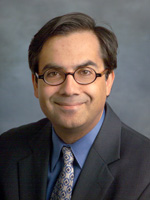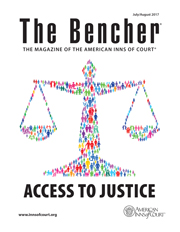Legal Ethics and Access to Justice
The Bencher—July/August 2017
By John P. Ratnaswamy, Esquire

 The world of legal ethics intersects in many ways with efforts to improve access to justice. Here are a few.
The world of legal ethics intersects in many ways with efforts to improve access to justice. Here are a few.
One way in which those two subjects intertwine is through ethics rules relating to pro bono service. In the July/August 2013 issue of The Bencher, I wrote about “Pro Bono Expectations and the Ethics Rules”. A majority of states require pro bono reporting, but few require pro bono service, setting aside court appointments. In 2016, after Associate Justice Sonia Sotomayor urged mandatory pro bono service, Verdict featured a point/counter-point on the subject. See https://verdict.justia.com/2016/07/18/forcing-lawyers-perform-pro-bono-services and https://verdict.justia.com/2016/08/26/response-forcing-lawyers-perform-pro-bono-services.
Another interrelated subject is conflicts of interest. In the November/December 2009 issue of The Bencher, I wrote about “Short-Term, Limited Pro Bono Services and Conflicts of Interest Rules”. I discussed the then relatively new American Bar Association Model Rule of Professional Conduct 6.5, which is entitled “Nonprofit and Court Annexed Limited Legal Services Programs”. Rule 6.5 creates exceptions to the current and former conflicts of interest rules (Model Rules 1.7 and 1.9, respectively) in certain situations involving lawyers serving as volunteers in programs in which clients are provided short-term, limited legal services under the auspices of a nonprofit organization or a court-annexed program. The paradigm situation contemplated by the rule is the legal advice hotline or pro se clinic, the purpose of which is to provide short-term, limited legal assistance to persons of limited means who otherwise would go unrepresented.
Unauthorized practice of law (“UPL”) principles relate to access to justice concerns in multiple respects. A special access to justice issue is the application of UPL principles in the wake of a major disaster. In that situation, conflicts of interest remain a concern, but dealing with unauthorized practice of law principles has been a focus of attention. ABA Model Rule 5.5, entitled “Unauthorized Practice of Law; Multijurisdictional Practice of Law”, in the body of the rule, does not explicitly address the subject of out of state lawyers providing services in an emergency in a state where they are not licensed. Comment 14, however, does bring up the subject, and points to the ABA’s “Model Court Rule on Provision of Legal Services Following Determination of Major Disaster”. A number of states have adopted rules on legal services ethics following a major disaster.
Another UPL/access to justice subject is the use of limited license legal technicians. In June 2012, the Supreme Court of the State of Washington adopted a court rule authorizing persons who are not traditionally licensed lawyers to deliver legal services in a limited fashion. Washington remains the only State that has such a structure, although Utah is working on a program. See, e.g., http://www.abajournal.com/news/article/despite_kinks_in_program_nonlawyers_are_successfully_providing_some_legal_s.
In February 2016, the ABA’s House of Delegates adopted “Model Regulatory Objectives for the Provision of Legal Services”. This Model arose as a proposal of the ABA’s Commission on the Future of Legal Services. The Model provides model regulatory objectives for state regulators considering how to regulate nontraditional legal service providers, including but not limited to limited legal service technicians. The debate preceding the House’s meeting was vigorous, and opposition was expressed as well as amendments proposed. See, e.g., http://www.abajournal.com/news/article/house_approves_proposed_model_regulatory_objectives_for_nontraditional_lega. The 2016 Report of the ABA Commission on the Future of Legal Services may be found here. https://www.americanbar.org/content/dam/aba/images/abanews/2016FLSReport_FNL_WEB.pdf.
The ABA’s 2017 annual ABA Techshow conducted a panel discussion in which Avvo CEO Mark Britton, LegalZoom CEO John Suh, and Rocket Lawyer CEO spoke about their visions for the future. The discussion reflected that UPL questions have been raised in relation to their business models. http://www.abajournal.com/news/article/techshow_keynote_panelists_reflect_on_regulations_and_consumer_service
And then there are robots. See, e.g., http://www.abajournal.com/news/article/the_robot_lawyers_are_coming_to_help_not_to_take_your_jobs. They may or may not obey the Three Laws. https://en.wikipedia.org/wiki/Three_Laws_of_Robotics.
We have a lot to think about.
John P. Ratnaswamy, Esquire, is a partner in the Chicago law firm of Rooney Rippie & Ratnaswamy LLP. He also serves as an Adjunct Professor of Legal Ethics at the Northwestern University School of Law. He is a former member of the American Bar Association’s Standing Committee on Ethics and Professional Responsibility and the Hearing Board of the Illinois Attorney Registration & Disciplinary Commission. This column should not be understood to represent the views of any of those entities or John’s or the firm’s current or former clients.
© 2017 JOHN P. RATNASWAMY, ESQ. This article was originally published in the July/August 2017 issue of The Bencher, a bi-monthly publication of the American Inns of Court. This article, in full or in part, may not be copied, reprinted, distributed, or stored electronically in any form without the express written consent of the American Inns of Court.